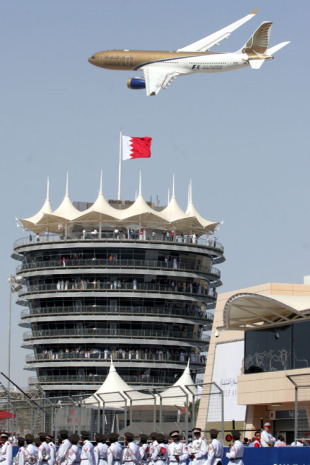
- In Focus:
- Bahrain Grand Prix Controversy
The announcement that Bahrain is back on has come as a shock to many.
In Barcelona I spoke with a senior figure in the Bahraini camp who told me the situation over there had cooled down and that they were confident of rescheduling. But in Monaco, where the teams sat down and discussed the race, I understand the preference not to go was pretty much unanimous.
Their reasons are three-fold: They don't believe it's safe; they believe going will send out a negative message; and their staff need time off in December. Ultimately, the teams believe turning up will cost them far more than they'll gain.
FOTA chairman Martin Whitmarsh is in a very tricky position, given McLaren is 30% owned by the Bahrain Mumtalakat Holding Company - which is wholly owned by the Kingdom of Bahrain. Some teams could threaten not to go - and if that happens, it rather lets FOM and the FIA off the hook as they can blame the teams for an ultimatum and, they would hope, cancel the race while still looking like the good-guys in the eyes of the Bahraini royals.
But Whitmarsh can't be seen to lead any revolt. The man is being pulled from all sides. The matter could threaten to splinter FOTA - which other forces would welcome, of course. I wonder whether Whitmarsh is prepared to step down and let Eric Boullier do the talking, or if he's prepared to fight his fellow members in order to keep his shareholder happy.
I would not like to be in his shoes. Mark Webber - who can always be relied upon as the one man who won't keep his lip buttoned while other drivers feel pressured to stay mute - says it's still unlikely we'll be going to Bahrain. "Even though a decision has been made, I'll be highly surprised if the Bahrain Grand Prix goes ahead this year," he wrote on his website.
We all want peace to return to Bahrain, and we want Formula One to return - whether to a kingdom or a republic. But despite the assurances of Bahrain and the FIA - who sent their man Carlos Gracia on a fact-finding mission on May 31 - the fact is that reports made by both credible western media and intelligence services claim that it is not. On Saturday Police fired tear gas and rubber bullets at protesters marching towards Pearl Square. Last Thursday, the day before the WMSC met, there was a similar stand off. On that occasion the security forces used bird-shot.
For the protesters the media coverage given to Formula One presents an opportunity too good to miss, surely. The circuit has a big X painted on it. Now I'm sure there will be a ring of steel put around the place on the week of the race, but I think it's unlikely they're going to stick a SWAT team outside my hotel room door.
F1 has found itself moving from the back pages to the front pages once again, and it's going to be a very interesting prospect for media on race weekend, of that there is no denying. I've got to say, though, finishing the season on December 11 doesn't fill me - or many others - with joy.
Having been away for so long during the increasingly elongated season, F1 personnel need their downtime to rest, to see family and friends, to attend to the garden, do the accounts, paint the downstairs bathroom, or to watch all seven Police Academy movies backto-back (I have had some gloriously unproductive off-seasons). I don't even open my mail when the season is on, so imagine how bulging my letter-box is going to be by mid-December. And when the hell is Christmas shopping going to take place?
I jest of course. This is but a minor gripe compared to the message F1 has sent to the world, and how this will affect the public opinion of the sport. And on this subject, Webber has been most eloquent: "I do not feel at all comfortable going there to compete in an event when, despite reassurances to the contrary, it seems inevitable that it will cause more tension for the people of that country. I don't understand why my sport wishes to place itself in a position to be a catalyst for that."
I'm not buying my plane ticket just yet.
Adam Hay-Nicholls is editor of GP Week and Formula One correspondent for Metro UK and Metro International

